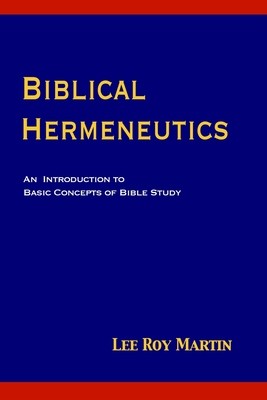
- We will send in 10–14 business days.
- Author: Lee Roy Martin
- Publisher: CPT Press
- ISBN-10: 1953358470
- ISBN-13: 9781953358479
- Format: 15.2 x 22.9 x 1.2 cm, minkšti viršeliai
- Language: English
- SAVE -10% with code: EXTRA
Reviews
Description
In this concise and accessible introduction, Prof. Lee Roy Martin sets forth the basic concepts of biblical hermeneutics, which is the process of interpreting Scripture. The name 'hermeneutics' comes from the Greek word hermeneuo, which means 'to explain, to interpret.' Therefore, biblical hermeneutics teaches the most effective methods and rules for explaining and interpreting the message of the Bible.
In general terms, the process of interpreting the Bible is much like interpreting other books. We read and we question the meaning of the text. We search for clues that will direct us toward meaning. The Bible, however, is unlike any book that we might find in today's bookstore. The Bible is different because it is an ancient document, originally written in Hebrew, Aramaic, and Greek. It reflects the elements of Middle Eastern culture, geography, history, politics, and customs. Furthermore, the Bible is made up of many types of literature, including stories, poetry, songs, proverbs, parables, prophecies, and letters from Christian leaders to the church.
This introduction to hermeneutics will help Bible readers of all ages and experience to gain a better understanding of Scripture and to discover its relevance to contemporary life.
EXTRA 10 % discount with code: EXTRA
The promotion ends in 22d.07:32:50
The discount code is valid when purchasing from 10 €. Discounts do not stack.
- Author: Lee Roy Martin
- Publisher: CPT Press
- ISBN-10: 1953358470
- ISBN-13: 9781953358479
- Format: 15.2 x 22.9 x 1.2 cm, minkšti viršeliai
- Language: English English
In this concise and accessible introduction, Prof. Lee Roy Martin sets forth the basic concepts of biblical hermeneutics, which is the process of interpreting Scripture. The name 'hermeneutics' comes from the Greek word hermeneuo, which means 'to explain, to interpret.' Therefore, biblical hermeneutics teaches the most effective methods and rules for explaining and interpreting the message of the Bible.
In general terms, the process of interpreting the Bible is much like interpreting other books. We read and we question the meaning of the text. We search for clues that will direct us toward meaning. The Bible, however, is unlike any book that we might find in today's bookstore. The Bible is different because it is an ancient document, originally written in Hebrew, Aramaic, and Greek. It reflects the elements of Middle Eastern culture, geography, history, politics, and customs. Furthermore, the Bible is made up of many types of literature, including stories, poetry, songs, proverbs, parables, prophecies, and letters from Christian leaders to the church.
This introduction to hermeneutics will help Bible readers of all ages and experience to gain a better understanding of Scripture and to discover its relevance to contemporary life.


Reviews